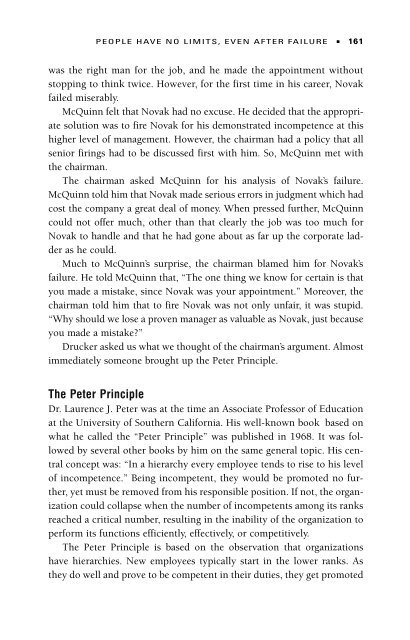A Class with Drucker - Headway | Work on yourself
A Class with Drucker - Headway | Work on yourself
A Class with Drucker - Headway | Work on yourself
Create successful ePaper yourself
Turn your PDF publications into a flip-book with our unique Google optimized e-Paper software.
PEOPLE HAVE NO LIMITS, EVEN AFTER FAILURE ■ 161<br />
was the right man for the job, and he made the appointment <str<strong>on</strong>g>with</str<strong>on</strong>g>out<br />
stopping to think twice. However, for the first time in his career, Novak<br />
failed miserably.<br />
McQuinn felt that Novak had no excuse. He decided that the appropriate<br />
soluti<strong>on</strong> was to fire Novak for his dem<strong>on</strong>strated incompetence at this<br />
higher level of management. However, the chairman had a policy that all<br />
senior firings had to be discussed first <str<strong>on</strong>g>with</str<strong>on</strong>g> him. So, McQuinn met <str<strong>on</strong>g>with</str<strong>on</strong>g><br />
the chairman.<br />
The chairman asked McQuinn for his analysis of Novak’s failure.<br />
McQuinn told him that Novak made serious errors in judgment which had<br />
cost the company a great deal of m<strong>on</strong>ey. When pressed further, McQuinn<br />
could not offer much, other than that clearly the job was too much for<br />
Novak to handle and that he had g<strong>on</strong>e about as far up the corporate ladder<br />
as he could.<br />
Much to McQuinn’s surprise, the chairman blamed him for Novak’s<br />
failure. He told McQuinn that, “The <strong>on</strong>e thing we know for certain is that<br />
you made a mistake, since Novak was your appointment.” Moreover, the<br />
chairman told him that to fire Novak was not <strong>on</strong>ly unfair, it was stupid.<br />
“Why should we lose a proven manager as valuable as Novak, just because<br />
you made a mistake?”<br />
<str<strong>on</strong>g>Drucker</str<strong>on</strong>g> asked us what we thought of the chairman’s argument. Almost<br />
immediately some<strong>on</strong>e brought up the Peter Principle.<br />
The Peter Principle<br />
Dr. Laurence J. Peter was at the time an Associate Professor of Educati<strong>on</strong><br />
at the University of Southern California. His well-known book based <strong>on</strong><br />
what he called the “Peter Principle” was published in 1968. It was followed<br />
by several other books by him <strong>on</strong> the same general topic. His central<br />
c<strong>on</strong>cept was: “In a hierarchy every employee tends to rise to his level<br />
of incompetence.” Being incompetent, they would be promoted no further,<br />
yet must be removed from his resp<strong>on</strong>sible positi<strong>on</strong>. If not, the organizati<strong>on</strong><br />
could collapse when the number of incompetents am<strong>on</strong>g its ranks<br />
reached a critical number, resulting in the inability of the organizati<strong>on</strong> to<br />
perform its functi<strong>on</strong>s efficiently, effectively, or competitively.<br />
The Peter Principle is based <strong>on</strong> the observati<strong>on</strong> that organizati<strong>on</strong>s<br />
have hierarchies. New employees typically start in the lower ranks. As<br />
they do well and prove to be competent in their duties, they get promoted


